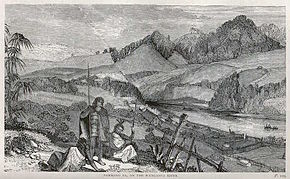
Parikino is a settlement 24 kilometres (15 mi) upriver from Whanganui, New Zealand; the original pā site was across the Whanganui River.
Parikino was originally a fortified settlement established in 1845 as security against a possible raid by a Ngāti Tūwharetoa taua (war party). The population of about 200 then gradually moved to the unfortified agricultural land across the river. Parikino is home to the Ngāti Hinearo and Ngāti Tuera hapū of the iwi Te Āti Haunui-a-Pāpārangi. The Ngāti Hinearo wharenui is called Te Aroha, and the Ngāti Tuera is Wharewhiti. The meeting house Maranganui Tuarua, 3 km south of Parikino at Pungarehu, was built for Ngāti Tuera by the carver Hōri Pukehika.
Parikino Sports Day, consisting mainly of horseback competitions and family activities, has run every year since 1928; farm chores are traditionally put on hold for the day.
One of New Zealand's most important contemporary photographers Ans Westra took a series of black-and-white photographs of children and teachers at the Parikino Maori School in 1963.
There are three marae in the Parikino area. Parikino Marae and Ko Wharewhiti or Te Aroha meeting house are a meeting place for Ngāti Hinearo and Ngāti Tumango. Ātene or Kakata Marae and Te Rangi-i-heke-iho meeting house are affiliated with Ngāti Hineoneone. Pungarehu Marae and Maranganui Tuarua meeting house are affiliated with Ngāti Tuera.
Education
Aberfeldy School is a co-educational state primary school for Year 1 to 8 students, with a roll of 16 as of November 2024.
References
- ^ Beaglehole, Diana (20 March 2014). "Whanganui places: River Settlements". Te Ara: The Encyclopedia of New Zealand. Retrieved 21 November 2015.
- Walton, A. (1994). "Settlement Patterns in the Whanganui River Valley, 1839–1864" (PDF). New Zealand Journal of Archaeology. 16: 123–168.
- "Parikino Pā". Māori Maps. Archived from the original on 8 December 2015. Retrieved 21 November 2015.
- "Pungarehu". Māori Maps. Retrieved 21 November 2015.
- Hyndman, Ian (27 February 2013). "Parikino prepares to party". Wanganui Chronicle. Retrieved 21 November 2015.
- Peers, Robyn (3 October 2007). "Ans Westra: Images and Emotion". Christchurch Press. Retrieved 21 November 2015.
- "Te Kāhui Māngai directory". tkm.govt.nz. Te Puni Kōkiri.
- "Māori Maps". maorimaps.com. Te Potiki National Trust.
- "Ministry of Education School Profile". educationcounts.govt.nz. Ministry of Education.
- "Education Review Office Report". ero.govt.nz. Education Review Office.
External links
| Whanganui District, New Zealand | |||||
|---|---|---|---|---|---|
| Seat: Whanganui | |||||
| Populated places |
| ||||
| Facilities and attractions |
| ||||
| Government | |||||
| Organisations | |||||
| Education | |||||
| Whanganui River | |
|---|---|
| Source: Mount Tongariro—Flows into: Tasman Sea | |
| Administrative areas | |
| Towns and settlements (upstream to downstream) | |
| Major tributaries (upstream to downstream by confluence) | |
| Other features (upstream to downstream) | |
| Longest New Zealand rivers |
|
39°48′S 175°09′E / 39.800°S 175.150°E / -39.800; 175.150
Categories: